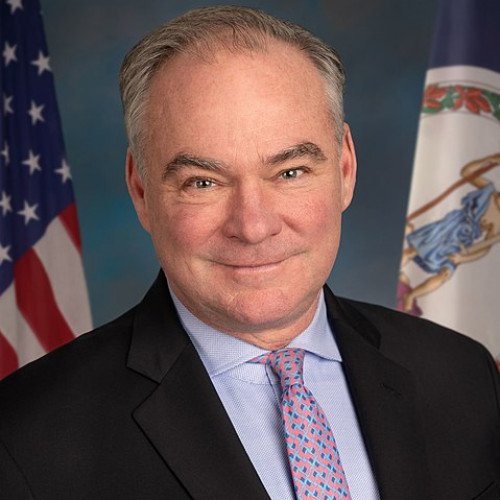Tim Kaine VS Barry Goldwater

Tim Kaine
Timothy Michael Kaine (, born February 26, 1958) is an American lawyer and politician serving as the junior United States senator from Virginia since 2013. A member of the Democratic Party, he previously served as the 38th lieutenant governor of Virginia from 2002 to 2006 and 70th governor of Virginia from 2006 to 2010. Kaine was the Democratic nominee for Vice President of the United States in the 2016 election as the running mate of Hillary Clinton. Born in Saint Paul, Minnesota, Kaine grew up in Overland Park, Kansas, graduated from the University of Missouri in Columbia, Missouri and earned a Juris Doctor degree from Harvard Law School before entering private practice and becoming a lecturer at the University of Richmond School of Law. He was first elected to public office in 1994, when he won a seat on the Richmond City Council. He was then elected Mayor of Richmond in 1998 and was in that position until being elected Lieutenant Governor of Virginia in 2001. Kaine was elected Governor of Virginia in 2005 and was in that office from 2006 to 2010. He was chairman of the Democratic National Committee from 2009 to 2011. Kaine joined the race for the 2012 Virginia Senate Race, and won the election. On July 22, 2016, Hillary Clinton introduced Kaine as her vice presidential running mate. The 2016 Democratic National Convention nominated him on July 27. Despite winning a plurality of the national popular vote, the Clinton–Kaine ticket lost the Electoral College, and thus the election, to the Republican ticket of Donald Trump and Mike Pence on November 8, 2016. Kaine successfully sought re-election to a second Senate term in 2018, defeating Republican Corey Stewart by a larger margin than expected.
Statistics for this Xoptio

Barry Goldwater
Barry Morris Goldwater (January 2, 1909 – May 29, 1998) was an American politician, businessman, and author who was a five-term Senator from Arizona (1953–1965, 1969–1987) and the Republican Party nominee for president of the United States in 1964. Despite his loss of the 1964 presidential election in a landslide, Goldwater is the politician most often credited with having sparked the resurgence of the American conservative political movement in the 1960s. He also had a substantial impact on the libertarian movement.Goldwater rejected the legacy of the New Deal and, along with the conservative coalition, fought against the New Deal coalition. A member of the NAACP and active supporter of desegregation in Phoenix, Goldwater voted in favor of the Civil Rights Act of 1957 and the 24th Amendment to the U.S. Constitution, but opposed the Civil Rights Act of 1964, believing it to be an overreach by the federal government—a decision that considerably anguished him. In 1964, Goldwater mobilized a large conservative constituency to win the hard-fought Republican presidential primaries. Although raised as an Episcopalian, Goldwater was the first candidate of ethnically Jewish heritage to be nominated for President by a major American party (his father was Jewish). Goldwater's platform ultimately failed to gain the support of the electorate and he lost the 1964 presidential election to incumbent Democrat Lyndon B. Johnson by one of the largest margins in history. Goldwater returned to the Senate in 1969 and specialized in defense and foreign policy. As an elder statesman of the party, Goldwater successfully urged President Richard Nixon to resign in 1974 when evidence of a cover-up in the Watergate scandal became overwhelming and impeachment was imminent. Goldwater narrowly won re-election in 1980 for what would be his final and most influential term in the senate. In 1986, Goldwater oversaw passage of the Goldwater–Nichols Act, arguably his most significant legislative achievement, which strengthened civilian authority in the Department of Defense. The following year, he retired from the Senate and was succeeded by John McCain, who praised his predecessor as the man who "transformed the Republican Party from an Eastern elitist organization to the breeding ground for the election of Ronald Reagan". Goldwater strongly supported the 1980 presidential campaign of Reagan, who had become the standard-bearer of the conservative movement after his "A Time for Choosing" speech. Reagan reflected many of the principles of Goldwater's earlier run in his campaign. The Washington Post columnist George Will took note of this, writing: "We [...] who voted for him in 1964 believe he won, it just took 16 years to count the votes". Goldwater's views grew increasingly libertarian as he neared the end of his career. After leaving the Senate, Goldwater's views cemented as libertarian. He criticized the "moneymaking ventures by fellows like Pat Robertson and others [in the Republican Party] who are trying to... make a religious organization out of it." He lobbied for homosexuals to be able to serve openly in the military, opposed the Clinton administration's plan for health care reform, supported abortion rights, and the legalization of medicinal marijuana.